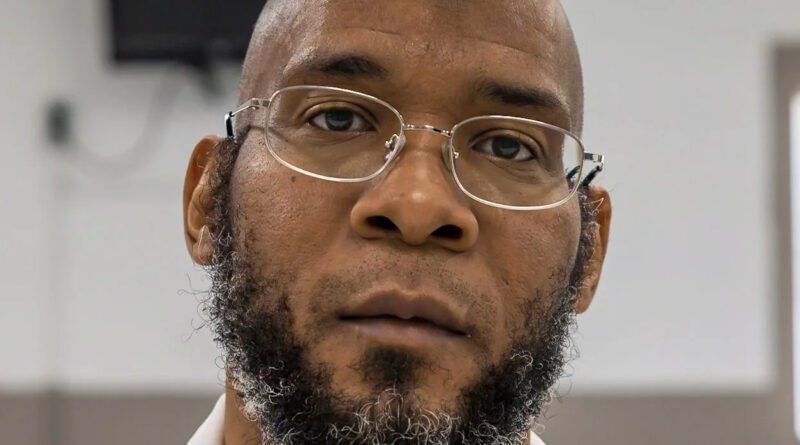Marcellus Williams Proven Innocent in 1998 Murder of Felicia Gayle But Death Sentence Moves Forward
The case of Marcellus Williams, who was convicted of the 1998 murder of Felicia Gayle, a former reporter in Missouri, has drawn widespread attention and sparked national debate over the criminal justice system, the death penalty, and the role of DNA evidence in determining guilt or innocence. Williams was sentenced to death for the brutal stabbing of Gayle, but questions surrounding the fairness of his trial and the use of forensic science have complicated the case for years. This article takes an in-depth look at the crime, the trial, and the ongoing controversy that has kept the case in the spotlight.
The Murder of Felicia Gayle
On August 11, 1998, Felicia Gayle, a 42-year-old former journalist for the St. Louis Post-Dispatch, was murdered in her home in University City, a suburb of St. Louis, Missouri. Gayle was stabbed 43 times in her home, located in a quiet and affluent neighborhood. At the time of her death, Gayle had retired from journalism and was involved in volunteer work, focusing on community outreach in underprivileged areas.
Her murder shocked the local community, both for its brutality and the fact that it occurred in broad daylight. There were no immediate suspects or apparent motives, making the investigation particularly challenging for law enforcement. Investigators believed that Gayle was killed during a burglary gone wrong, but the case remained unsolved for months until a tip led to Marcellus Williams.
The Arrest of Marcellus Williams
Nearly a year after the murder, police arrested Marcellus Williams in 1999, after receiving information from Henry Cole, an informant and prison acquaintance of Williams. Cole claimed that Williams had confessed to killing Gayle while they were both incarcerated together on unrelated charges. Additionally, a woman named Laura Asaro, who had been in a relationship with Williams, testified that she saw him with items that had been stolen from Gayle’s home on the day of the murder.
Williams was charged with first-degree murder, robbery, and burglary. He denied any involvement in the crime, maintaining his innocence from the outset. Despite the lack of direct evidence linking Williams to the scene, the testimony from Cole and Asaro, as well as the circumstantial evidence, formed the basis of the prosecution’s case against him.
The Trial and Conviction
Marcellus Williams’ trial began in 2001. The prosecution’s case relied heavily on the testimony of Cole and Asaro. Cole, who had a history of drug addiction and was facing his own legal troubles, told the jury that Williams had confessed to killing Gayle while discussing other crimes they had committed together. Cole’s testimony was controversial, as informants are often offered leniency in exchange for their cooperation, raising concerns about the credibility of his statements.
Laura Asaro’s testimony added another layer to the case. She claimed that Williams had brought home a laptop and other items that were later identified as belonging to Felicia Gayle. According to her, Williams had acted suspiciously and asked her to pawn some of the stolen goods. However, like Cole, Asaro had a criminal background, including drug use and theft, which cast doubt on her reliability as a witness.
The prosecution also presented circumstantial evidence, including items allegedly stolen from Gayle’s home. But the lack of forensic evidence tying Williams directly to the crime scene left gaps in the case. Despite these issues, the jury found Williams guilty of first-degree murder, and he was sentenced to death.
Post-Conviction Appeals and New Evidence
Following his conviction, Williams and his defense team launched a series of appeals, arguing that his trial had been unfair and that critical evidence had been overlooked. One of the key points of contention was the lack of physical evidence linking Williams to the murder. The defense pointed out that no fingerprints, DNA, or other forensic evidence placed Williams at the scene of the crime.
In 2015, after years of appeals, new DNA testing was conducted on the knife used to kill Felicia Gayle. The tests revealed that Williams’ DNA was not found on the weapon. Instead, the DNA belonged to an unknown male, which raised serious doubts about his guilt. This discovery prompted further calls for a re-examination of the case and led to additional legal challenges from Williams’ defense team.
Despite this new evidence, prosecutors maintained that Williams was guilty, arguing that the DNA evidence did not exonerate him. They contended that the absence of his DNA on the murder weapon did not rule out his involvement in the crime and pointed to the testimony of Cole and Asaro as proof of his guilt. Nevertheless, the revelation of the DNA evidence fueled widespread public outcry, with many questioning whether the right person had been convicted.
Governor Eric Greitens’ Stay of Execution
In 2017, Williams was scheduled to be executed. However, just hours before his execution, Missouri Governor Eric Greitens issued a stay, citing concerns about the DNA evidence and calling for the formation of a special board to review the case. The governor’s decision was seen as a major victory for Williams’ legal team and for advocates of criminal justice reform, who had argued that executing Williams without fully considering the new evidence would be a grave miscarriage of justice.
The creation of the special board, composed of five retired judges, was intended to evaluate the DNA results and other aspects of the case to determine whether Williams’ conviction should stand or if he should be granted clemency. This move brought the case into the national spotlight, drawing attention from media outlets, legal experts, and human rights organizations, many of whom argued that the death penalty should not be applied when significant doubt remained about the defendant’s guilt.
Public Outcry and National Debate
The case of Marcellus Williams has become a focal point in the broader debate over the death penalty, wrongful convictions, and the reliability of eyewitness testimony and informant evidence. Human rights organizations, including the Innocence Project, have raised concerns about the use of unreliable testimony to secure convictions, particularly in cases involving the death penalty.
The fact that Williams’ DNA was not found on the murder weapon has been a central argument for those advocating for a retrial or his release. Critics of the prosecution’s case point to the well-documented problems with using jailhouse informants and the pressure they often face to provide incriminating testimony, sometimes in exchange for reduced sentences or other incentives. This has led to calls for stricter guidelines regarding the use of informant testimony in capital cases.
Additionally, the case has highlighted broader systemic issues within the criminal justice system, particularly concerning the treatment of African American defendants. Williams, a Black man, was tried and convicted in a system where racial bias has been a longstanding concern. His case has drawn comparisons to other high-profile wrongful conviction cases where Black defendants were sentenced to death based on dubious evidence.
The Special Review Board and Its Impact
As of now, the special review board has not reached a final decision regarding Marcellus Williams’ fate. The process is ongoing, and the outcome remains uncertain. The board’s decision will determine whether Williams’ death sentence will be carried out, whether he will be granted a new trial, or whether he may be exonerated based on the new DNA evidence.
The case is being closely watched by legal experts, activists, and the public, as it could set a significant precedent for how death penalty cases are handled in the future. If Williams is exonerated, it would further reinforce the argument that the criminal justice system must place greater emphasis on forensic evidence and limit the reliance on potentially unreliable eyewitness or informant testimony.
Marcellus Williams Execution
On September 24, 2024, Marcellus Williams was executed in Missouri despite ongoing controversy and doubts about his guilt. The U.S. Supreme Court declined to stop the execution, despite DNA evidence that did not link Williams to the 1998 murder of Felicia Gayle. His case had garnered national attention, with many arguing that the new forensic evidence cast serious doubt on his conviction. Williams’ execution went forward amid significant public and legal debate over the fairness of his trial and the reliability of the evidence used to convict him.
The Future of the Death Penalty in Missouri
The case of Marcellus Williams has reignited the debate over the death penalty in Missouri and the United States as a whole. Critics argue that the risk of executing an innocent person is too high, given the number of wrongful convictions that have been uncovered in recent years. According to the Death Penalty Information Center, since 1973, more than 190 individuals in the U.S. have been exonerated from death row, highlighting the potential for errors in the justice system.
In Missouri, the case has spurred calls for reform. Advocates are pushing for a moratorium on the death penalty until more robust safeguards are put in place to prevent wrongful convictions. Others are calling for the abolition of the death penalty altogether, arguing that life without parole is a more humane and just alternative, especially when new evidence such as DNA testing can alter the course of a case years after a conviction.
Conclusion
The case of Marcellus Williams is a stark reminder of the complexities and potential pitfalls of the criminal justice system, particularly in death penalty cases. Williams, convicted of the 1998 murder of Felicia Gayle, has maintained his innocence for over two decades, and new DNA evidence has raised serious doubts about his guilt. While the case is still under review, it has become a symbol of the ongoing fight for justice reform, the importance of forensic science, and the need for caution when imposing the ultimate punishment.
As the case continues to unfold, it serves as a critical examination of how the U.S. legal system handles capital punishment and the profound consequences of getting it wrong. Whether Marcellus Williams will be granted a new trial or his death sentence will be carried out remains to be seen, but his case has already left an indelible mark on the national conversation about justice, fairness, and the future of the death penalty.
Discover more from City Towner
Subscribe to get the latest posts sent to your email.




